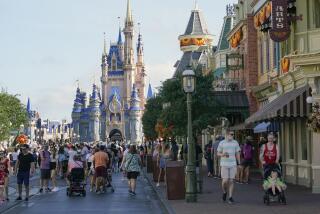Tourism Industry Sees an Upturn
- Share via
Despite expectations of a sluggish holiday season after Sept. 11, some of the country’s major tourist sites and attractions received a welcomed jolt in attendance, fueled by heavy discounting, rising consumer confidence and plain, old restlessness.
Theme parks in Florida and California reported packed crowds over the holidays. Las Vegas said the arrival of some 300,000 visitors pushed the city’s hotel occupancy rate to 97% during the extended New Year’s weekend. Hawaii, which has been devastated by a drop in tourism since Sept. 11, attracted 90% of the visitors during the week of Christmas that it did the previous year, tourism officials said.
Although analysts remained cautious about the near-term outlook for travel and tourism, they said the unexpectedly strong holiday activity reflects slow but steady recovery in the industry.
America West and Continental airlines reported Thursday that although passenger traffic in December was down because of flight reductions, their so-called load factors for the month were essentially the same as December 2000.
“We are encouraged by signs that customers are gradually returning to the skies,” said Scott Kirby, America West’s executive vice president of marketing.
Lynn Franco, director of the Conference Board’s research center, said the rush of holiday travel is in line with her organization’s latest consumer confidence index, which showed an encouraging rebound in December after declining the three previous months.
“The increase shows the economy may be bottoming out and a rebound by mid-2002 is likely,” she said.
Over the holidays, Walt Disney Co.’s Walt Disney World in Orlando, Fla., said it closed the gates three times because of throngs of visitors. Disneyland and Vivendi Universal’s Universal Studios in Hollywood boasted their strongest attendance since the terrorist attacks. The turnout was even bigger for Legoland California in Carlsbad, Calif., where officials said the last two weeks of December were the busiest of the year.
“The timing of our discounts, holiday programs and new fireworks show all came together to make it a huge holiday season for us,” said spokeswoman Courtney Simmons, noting that attendance for both weeks was 15% higher than in 2000. “Plus, you have to remember our niche. It’s families with children 2 to 12, and being with family is what it’s all about right now.”
In Anaheim, hotel occupancy remained strong the week after Christmas through New Year’s Eve, when nearly 65,000 visitors descended on Disneyland and California Adventure for the annual countdown and fireworks show.
An additional 60,000 from Nebraska and 20,000 from Miami made the trip to Los Angeles for the Rose Bowl, according to tourism officials who generally count on the event to bring in about $200 million in visitor spending.
“They came and they spent money,” said Jack Kyser, chief economist at the Los Angeles County Economic Development Corp. “We love them one and all.”
For many hotels, however, the holiday boost amounted to far less in revenue this year.
At places such as Orlando, room rates are down from 20% to 50%, said Richard Maladecki, president of the Central Florida Hotel Motel Assn. And analysts say the rest of the winter will be soft for travel and tourist businesses--with some places not expecting a full recovery for another year.
Orlando--which claimed at least an 85% occupancy rate for its 107,000 hotel rooms the week after Christmas--finished the month with an overall rate of 55%, down from 70% a year earlier, officials said.
“We hope it will get better, but our advance reservations aren’t as strong as they should be, and things have already slowed way, way down here,” Maladecki said.
Tourism consultant Peter Yesawich said the brief bump in business was “a bright light” for the sagging industry but should not be considered a barometer for what 2002 will bring. His Orlando-based firm, Yesawich, Pepperdine & Brown, has conducted three polls since Sept. 11 related to travel intent and each time the numbers have improved--but only slightly, he said.
“This coming year is going to produce a slow recovery, accelerated by heavy promotional pricing and led by leisure travelers,” Yesawich said. “People are looking for destinations closer to home, but they are slowly, slowly becoming less skittish about flying too.”
In Hawaii, tourism last year was down 28% from 2000. The state’s tourism officials said international visitors, who comprise one-third of the total, are creeping back. Andy Kish, an economist at Economy.com, said the number of arrivals in Hawaii from Japan for Christmas reached about 80% what it was in 2000. In September and October, the number was less than 40% of the prior year, he said.
Eugene Tian, an economist for Hawaii’s Economic Development and Tourism Research, said he doesn’t anticipate more than a 3% growth in tourism this year.
“We’re still a little pessimistic,” Tian said. “Our economy is far weaker now. We won’t pull out of this completely until 2003.”
Some industry experts doubt it will take that long elsewhere, as the country moves further away from Sept. 11 and families begin to move around again. Theme parks may benefit the most, said Tim O’Brien, senior editor of Amusement Business, which tracks the industry.
More to Read
Sign up for The Wild
We’ll help you find the best places to hike, bike and run, as well as the perfect silent spots for meditation and yoga.
You may occasionally receive promotional content from the Los Angeles Times.






